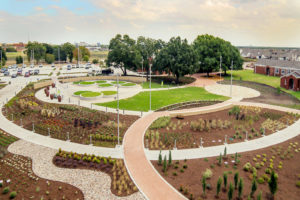Texas A&M AgriLife expands footprint with renovated urban campus in Dallas
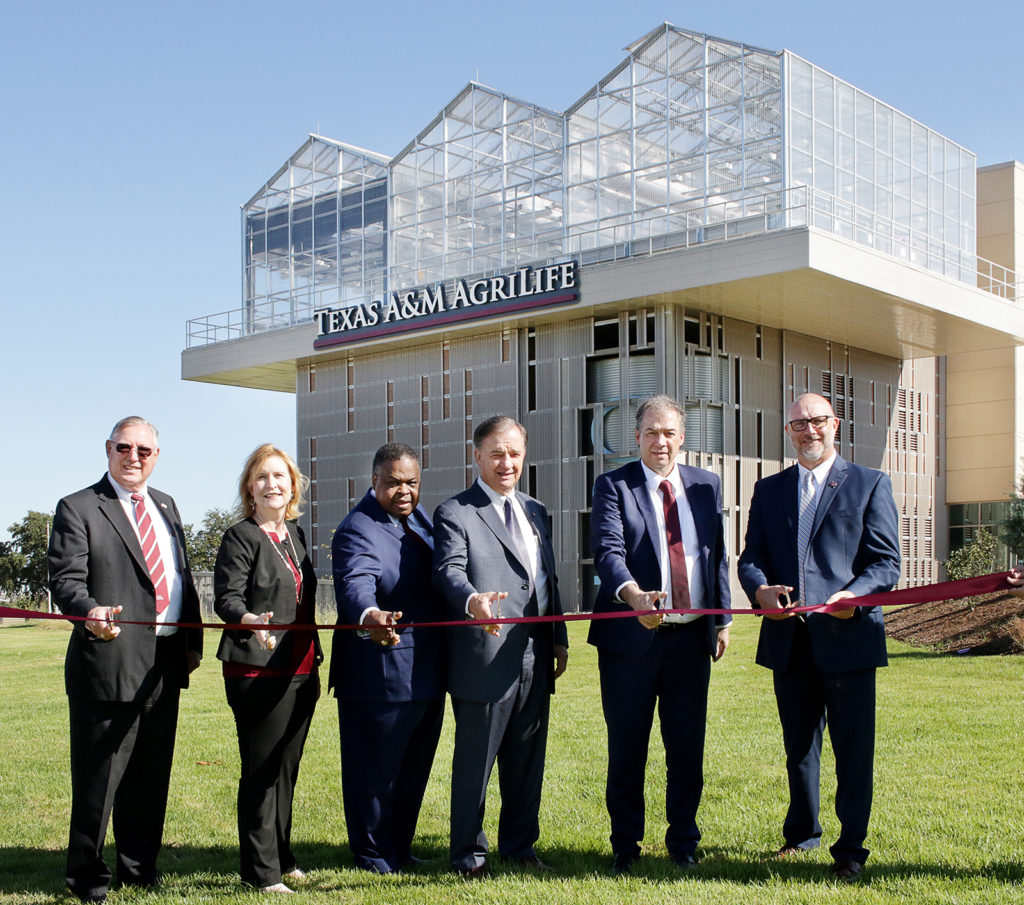
Texas A&M AgriLife on Tuesday hosted a grand opening of the Texas A&M AgriLife Center at Dallas renovated campus, which aims to serve as a rural-urban interface connecting Texans to their food sources, environmental sustainability and healthy living.
“Agriculture must become integral to urban culture,” said Patrick Stover, Ph.D., vice-chancellor of Texas A&M Agrilife, dean of the College of Agriculture and Life Sciences and director of Texas A&M AgriLife Research. “With today’s technologies and centers like the Dallas Center, we have the potential to meet expectations and feed the world with nutritious food that prevents disease and is environmentally sustainable.”
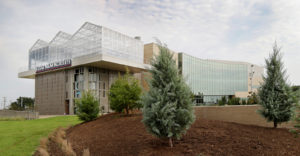
The Dallas center features a new 60,000-square-foot Urban Agriculture and Forestry Building with research laboratories, plant tissue culture facilities and advanced rooftop research greenhouses. Its curved design and smart glass installations take advantage of the sun’s path in daily heating and cooling for energy efficiency. The headquarters houses center administration, Texas A&M AgriLife Research scientists and Texas A&M AgriLife Extension Service specialists.
In addition to AgriLife Research and AgriLife Extension, the Dallas Center houses members of the Texas A&M Forest Service as well as Texas Water Resources Institute and Texas A&M Natural Resources Institute. These entities work collaboratively, and they undertake initiatives for improving urban agriculture and forestry, water and land resources, and healthy living for all Texans.
“More than a third of all the research by Texas A&M University comes from these agencies, and their reach into 250 counties is unprecedented for any university in the country,” said John Sharp, chancellor of the Texas A&M System. “There is no other place in the United States that has agencies this important to the country and to the state than the agencies of Texas A&M.”
Around campus
Outside the headquarters building are The Gardens at Dallas. This 4-acre, public landscape of Texas native and adapted ornamental plants demonstrates resource-efficient design and irrigation, and it displays turfgrass varieties developed at the center.
On the northern side of campus, the new Water and Land Resources building – an 8,000-square-foot teaching and gathering space – provides a guest capacity of 300. The building adorns the new Benny J. Simpson Ecopark. Once agricultural research land, this 7-acre spread of reclaimed Texas Blackland Prairie features a 3-acre serpentine rainwater detention pond, more than 140 species of Texas native and adapted plants and a sign-guided walking nature tour.
“We are proud of the magnificent buildings and gardens we have constructed,” said David Lunt, Ph.D., associate director for AgriLife Research and interim director of the Dallas center. “But it is our people who are our greatest asset as we endeavor to bring world-class, cutting-edge science to bear on the challenges facing urban, suburban and rural communities.”
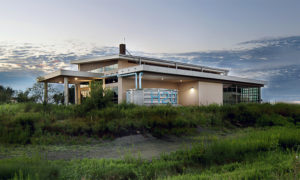
Green Innovation
The entire Dallas campus serves as a demonstration of green infrastructure and native plants for sustainability in urban development. Two 30,000-gallon display cisterns and one underground 40,000-gallon cistern bring the center’s rainwater harvesting and irrigation capacity to 100,000 gallons.
Overflow from the cisterns, and from parking lot bioswales on campus, runs into the ecopark and detention pond, resulting in a zero-net stormwater discharge from the campus.
Advancing Texas
The overarching objectives and future direction of the Dallas center dovetail with Texas A&M AgriLife’s Advancing Texas initiative to bridge rural and urban divides at the intersection of agriculture, health best practices and research. On Oct. 8, the Dallas Center hosted a panel on agriculture’s role in the urban-rural interface.
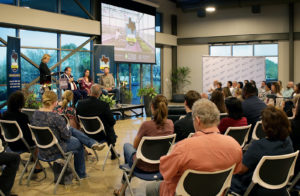
As the state becomes increasingly urbanized, many Texans have little connection to agriculture. Texas A&M AgriLife has the unique opportunity to create a national model to link urban and rural populations and ensure every Texan, regardless of zip code, appreciates the role food plays in their daily lives. Panelists included Jeff Bednar of Profound Microfarms, which provides sustainably grown fresh produce to more than 60 local Dallas chefs; Rebecca Seguin, Ph.D. public health scientist and associate director of Texas A&M AgriLife Research; and Patrick Stover.
Advancing Texas allows Texas A&M AgriLife to hear from stakeholders across the state. It aims to engage new supporters who seek to address state and national health issues.
Video: The Dallas center, past and present
The video below is a historical overview of the Dallas center and information on the center’s current direction.
